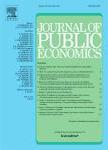-
作者:Boadway, R; Marchand, M; Vigneault, M
作者单位:Bishops University; Queens University - Canada; Universite Catholique Louvain
摘要:Tax and expenditure policies are studied in a federation with imperfectly mobile households. States implement a linear progressive tax and supply a public good. A vertical fiscal externality, reflecting the effect of state policies on federal revenues, provides an incentive for state taxes to be too progressive. A horizontal fiscal externality causes nonoptimal state taxes and expenditures because of the migration effect. The federal government implements its own Linear progressive tax and mak...
-
作者:Zhang, J
作者单位:University of Dundee
摘要:Empirical findings reveal that the relationship between private and public consumption generically differs from country to country: it is substitutable for some, while it is complementary for others. The present paper incorporates this regularity into a simple growth model with public goods which affect utility and production. The model casts off the standard assumption of socially constant returns to scale, and as a result it generates many interesting dynamic features, which do not arise wit...
-
作者:Peck, RM
作者单位:University of Illinois System; University of Illinois Chicago; University of Illinois Chicago Hospital
摘要:Aggregate excess burden arising when a poll tax or uniform lump sum tax is replaced by an excise tax is examined. If preferences are identical and homothetic, then the aggregate excise burden is always non-negative and independent of the distribution of income. An example with non-homothetic preferences is given, however, where the aggregate excess burden is negative. The implications for policy and positive public finance are briefly discussed. (C) 1998 Elsevier Science S.A.
-
作者:Helsley, RW; Strange, WC
作者单位:University of British Columbia
摘要:Private governments are voluntary, exclusive organizations that supplement services provided by the public sector. This paper examines resource allocation with and without a private government. We show that the existence of a private government causes the public sector to reduce provision of a collective good. We also show that the private government may be inefficiently small, The welfare effects of private government are complex. Although some agents are made worse off, aggregate nonmember w...
